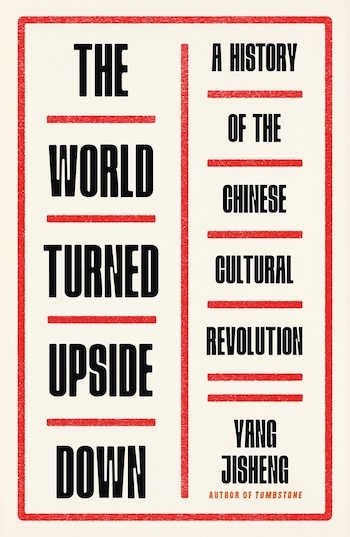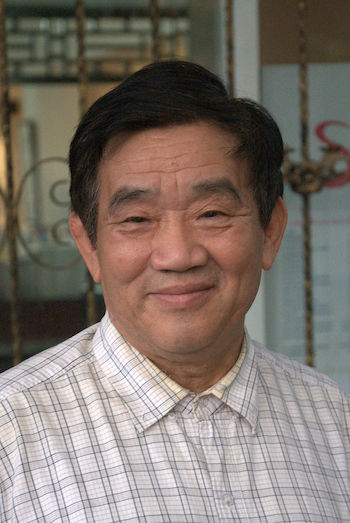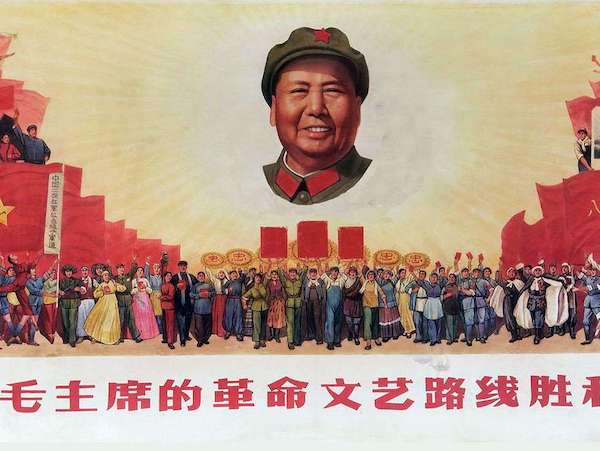Book Review: Yang Jisheng’s “The World Turned Upside Down”
By Maxwell Olin Massa
Those who admire Yang Jisheng’s distinguished career should pick up this book. Those searching for a solid, accessible history of Mao’s Cultural Revolution should look elsewhere.
The World Turned Upside Down: A History of the Chinese Cultural Revolution by Yang Jisheng. Translated from the Chinese by Stacy Mosher and Guo Jian. Farrar, Straus & Giroux, 768 pages, $40.
Buy from Bookshop

Yang Jisheng’s The World Turned Upside Down has the heft and pedigree to achieve a long-desired goal: an objective, monumental history of China’s Great Proletarian Cultural Revolution. I looked forward to reading the book, and not only because it was written by an independent scholar who lived during that period. I wrote my master’s thesis on the movement during my time at Nanjing University and I know that there is a need for an expansive historical understanding of that era for an international readership.
But Yang’s work fails to be the important work it could have been. It disappoints for a host of reasons, including issues concerning the translation that render what value the book does have opaque to the nonspecialist. So, while I cannot recommend the volume, exploring the reasons why it falls short may be helpful to students of the era and to translators of Chinese writing. Pliny the Elder noted in his Natural History that “no book is so bad that some good cannot be gotten out of it,” so I hope Yang’s labors will generate some useful lessons for others.
The World Turned Upside Down had considerable promise. Yang is an eminent figure in the edgier circles of the Chinese intelligentsia. His earlier work, Tombstone: The Great Chinese Famine, 1958-1962 (published in English by Farrar, Strauss & Giroux in 2013) is considered by many to be a highly significant work of historiography. In terms of his background, Yang served for 12 years as deputy editor of the historical-interest periodical Yanhuang Chunqiu (variously Englished as Chronicles of History or China through the Ages – I’ll be using the Chinese name throughout this review), which specialized in publishing pieces that pushed the envelope of political acceptability in writing history, to the point that the Xi Jinping regime forcibly shuttered it in 2016. His biography suggests that he is well positioned to draw on his own memories in writing this new book on Mao’s final political movement: Yang was born in 1940, making him 26 years old in 1966, an adult the year the Cultural Revolution formally started. Furthermore, he entered the Communist Party in 1964 and began work as a journalist at the Xinhua News Agency in 1968, providing him with a valuable vantage point.
So, given Yang’s track record and background, how could his book miss its mark? The problem is that Yang’s treatment of history is rooted in the limited methodology of the Yanhuang Chunqiu, which is historical exposé. Yang applied it to writing a macroscopic history, and it doesn’t fit. Almost all the book’s limitations are rooted in this central issue, and they are only exacerbated when presented to an English-speaking readership.
First and foremost, Yanhuang Chunqiu tended to concern itself heavily with righting the historical record, which assumes a reader’s prior awareness of the story as it stood. Yang nods at this in passing in his Author’s Note, noting that he recognizes that “most of the people who experienced the Cultural Revolution are still alive and well.” He approaches history as if he were writing for eyewitnesses, and that means he often takes it for granted that his readers have necessary background knowledge to fill in major gaps. For a Chinese readership, this is not a difficult challenge. But, in translation, it is crippling.
The problematic nature of this approach becomes immediately apparent when early on Yang discusses the state of the People’s Republic of China at the time of its establishment in 1949. He notes that “[a]lthough the regime had a constitution, it was basically meaningless.” This would imply that there was either an already existing constitution prior to 1949 or it was framed that year. Neither of these assumptions is correct. The People’s Republic of China constitution was passed in September 1954, and this fact is (unsurprisingly) very well known to the Chinese themselves. But taking such essential details for granted hobbles a historical narrative in which as little as possible should be assumed.

Author Yang Jisheng. Photo: Wiki Commons.
Yang’s tendency to paint the social and political background with a broad brush results in errors of fact, as when he asserts that “[a]s [Central Military Committee] chairman, Mao commanded the gun that commanded the party, and as chairman of the [Chinese Communist Party] Central Committee, he controlled the entire populace through the bureaucratic system.” Yes, early on Mao was already a commanding political figure, but the phrase “he controlled the entire populace through the bureaucratic system” seems to ignore the existence of the Kuomintang Islamic Insurgency in Northwest China, which ground on until 1958. Instances of generalizations like these are alarmingly frequent, particularly those that deal with the behavior of the public and their continued receptivity to the Communist Party’s policies.
The author’s trade as a journalist researching exposés is apparent in the book’s concentration on China’s senior leaders, their personal decisions, grievances, and relationships. Other facets of history are excluded. Yes, there’s great value in laying bare the hidden rivalries and tangled plots that bollixed up various cliques and factions in power. In his account, Yang emphasizes, again and again, what various groups of well-positioned people thought of each other and how they fell out of favor with Mao and ended up on the chopping block. But this high-echelon action takes place against a background that is largely left blank: the result is that the history feels like a Victorian drama stuffed with way too many people, in which officials pass notes to each other in various rooms and everyone feels dreadfully put out, but they’re all essentially acting in the same space and at the same time. The author also displays a fondness for ranks, titles, and committee names, but doesn’t give any hint as to why it matters that, for example, Lu Dingyi was the Minister of Culture at the time of his downfall. This approach also often produces catalogs of names that will be bewildering to the uninitiated, as in this example, drawn from the proceedings of Luo Ruiqing’s denunciation at the Jingxi Guesthouse in Beijing:
Qiu Huizuo recalls Ye Jianying, Xie Fuzhi, Xiao Hua, Yang Chengwu, and Liu Zhijian among those who charged the enemy lines. Carrying special weight were Xiao Hua’s denunciation and Yang Chengwu’s repeated exposure, as well as Ye Jianying’s summing up speech. Once a close confederate of Luo’s, Xiao Hua denounced him with all his might.
This obsessive focus on the he-said, she-said side of history may be of interest to the in-house cognoscenti, rooting for lurid details, perhaps a thrill, in the ruins of history. And, if the sourcing is a fair indicator, the particular detail quoted above might actually be quite toothsome, coming as it does from Qiu Huizuo’s autobiography, which was published in Hong Kong in 2012. But this proclivity for vivid exposé has also led the historian to interject frequent snatches of speech and dialogue into his narrative, sometimes without adequate citation. The careful reader is left to wonder what fraction of reported conversation and oratory actually occurred. How much of this talk is dramatic fiction, inserted for rhetorical effect?
Touching on Qiu Huizuo’s autobiography brings us to the delicate issue of sourcing, which becomes doubly significant when chronicling a sensitive period in the past of a regime that discourages scrutiny. Yang’s appetite for reading was obviously immense; the variety of material brought to bear in The World Turned Upside Down is prodigious. But there is a debilitating lack of breadth and engagement. In terms of the former, a perusal of the works cited makes it clear that only pieces written originally in or translated into Chinese were consulted. This might not sound like a major issue to readers who have not spent time researching the history of the People’s Republic of China. But it is a significant problem because of political restrictions. When I was at Nanjing University working on my thesis about the Cultural Revolution, my advisor, Dong Guoqiang (who appears second to last on the list of academics thanked by Yang for their assistance), pointed out that much of his work was considered far too sensitive to be published in mainland China. It could appear in English only, in Hong Kong. Ironically, much of the best investigative writing that has been done on the era of Mao’s final movement is only available in English or Japanese, unless it was translated from the Chinese (as was the case with Hideo Kiyama’s work on the poetry of the Mao era). Thus Yang is very limited regarding the material he can draw on to support his views: his use of primary source material is to be applauded, but his almost total neglect of academic journals raises consequential questions about his analysis.
And then there is the matter of his engagement with his sourcing: although Yang is eager to give the (largely accurate, in my experience) impression that the Chinese Communist Party (CCP) does not appreciate independent probing, he nevertheless goes on to reference sources produced by such entities as the CCP Central Committee Documentary Research Room, the CCP Central Archives Research Office, the Central Party Literature Press, and the History of the Chinese Communist Party Publishing House, all without much skeptical assessment, justification, or qualification. Much of the documentation generated by these organizations is, doubtless, of very high value. Still, their direct affiliation with the Party makes them open to suspicion of being propaganda rather than accurate reporting, so a little critical appraisal would have been welcome. Instead, the author tends to list his sources without comment in endnotes. He lets their authority stand on its own, which is unsatisfying.
And the issue of sourcing brings us around to the question of translation, which would appear to have been in good hands. Stacey Mosher and Guo Jian both worked with Yang on Tombstone. The New York Times reports that they partnered with him in producing the text of The World Turned Upside Down. As far as the language goes, the history reads well enough; but the translators, faced with an admittedly difficult task, made a couple of policy choices that undercut the quality of their effort. First of all, and relevant to the foregoing issue of sourcing, was the decision to translate all the titles of the works cited in the Notes section completely into English, effectively encrypting them. For most readers this won’t be a serious issue, but for those who have the language skill and desire to dig up the work on which Yang’s history is based, it is highly frustrating: no ISBNs are provided, so the interested are obliged to guess and guess and guess at what the original title might have been, until the right combination of Chinese is hit upon.

A poster during the Cultural Revolution. Photo: Wiki Commons.
They were also very sparing with necessary annotations. When, for example, Yang references the aforementioned Qiu Huizuo, the fact that he was the head of the PLA’s General Logistics Department is not supplied. But this would help the reader understand why his testimony is being brought to bear on military issues. In truth, to make the book comprehensible to people without solid backgrounds in Chinese history it would need to have been heavily footnoted. As it is, one sometimes gets the feeling that the only people who would be prepared to really digest and appreciate its contents are those whose prior understanding is such that they would be able to read it in the original. Again, the decision to eliminate Chinese characters is very unhelpful here. Some minor historical figures with common names prove incredibly difficult to locate on the Internet. Hunting down a reference made to someone named Liu Jingfan, with whom I was not familiar, I went to Google for support (there is no Wikipedia article on this person). The first couple of hits I got were for a contemporary Chinese composer, a LinkedIn account for a professional in the Sydney area, and a précis of a journalist’s work for the British Journal of Cancer.
In addition, the translators’ notes are mixed, along with the citations, into the back of the volume, making access unwieldy and difficult. More annotations, on the same page as the text itself, would have improved comprehension considerably. An effective translation of a history from another language is obliged to help readers understand what was in the original. Compounding this problem is Yang’s bad habit of assuming readers are already familiar with a great deal of background knowledge. That made providing essential information and context in this history particularly pressing. I know how onerous such a task would have been, but it was necessary to make The World Turned Upside Down as accessible as possible to a broad readership in English.
This was a distressing review to write because I have enormous respect for Yang Jisheng, a brave and distinguished writer. During 2007 and 2008 I worked evenings at Beijing’s Sunway Salon. My day job was at CCTV. During that time I met a number of the more free-minded Chinese literati. For them, Yanhuang Chunqiu was a must-read publication. And I strongly support the principles and freedoms Yang cherishes and defends: that political leaders should be held accountable, that there should be no government intervention in publishing, and that crimes hidden in the past should be uncovered and brought to light. Also, it is painful to render a harsh judgment on the work of a man who is now over 80 years of age.
Still, for all its promise, The World Turned Upside Down is far from a triumph of the historian’s art. Yang’s book reminded me of Jane Jacobs’s Dark Age Ahead – a late-career volume from a noted author that makes a strong case for indispensable values, but is deeply troubled in its execution. Those who admire Yang’s career and determination should pick up this book. Those searching for a solid, accessible history of Mao’s Cultural Revolution should look elsewhere.
Maxwell Olin Massa is a graduate of the Hopkins-Nanjing Center and currently works as a policy analyst in the DC area. In addition to having written on the rule of law, he is also a staff writer for Third Factor magazine and published House of Apollo, a novel of ideas, with Whiskey Tit Books in 2020. He was even a Chinese TV host for a year, once upon a time.
Tagged: Mao, Maxwell Olin Massa, The World Turned Upside Down
